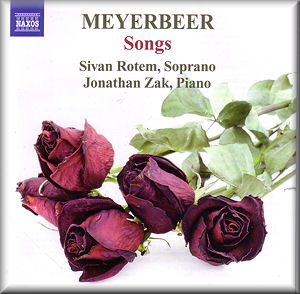 |
 |
|


alternatively
CD:
MDT
AmazonUK
AmazonUS
Sound Samples & Downloads
|
Giacomo MEYERBEER (1791–1864)
Songs
1. Le ricordanze (1833) [3:22]
2. De’ miei giorni (Délire)(1840) [2:46]
3. Il nascere e il fiorire d’una rosa (1823) [2:36]
Sei (6) canzonette italiane (1810)
4. Sceglier fra mille un core [1:34]
5. Da voi, da voi, cari lumi [2:40]
6. Giura il nocchier [1:53]
7. Bei labbri che amore [3:42]
8. Se non ti moro allato [1:56]
9. Basta dir ch’io sono amante [1:41]
10. La dame invisible (1845) [4:49]
11. Rachel à Nephtali (1834) [5:08]
12. La Ballade de la Reine Marguerite de Valois (1829) [2:50]
13. Sur le balcon (1845) [5:09]
14. Le baptême (1839) [2:24]
15. La folle de St Joseph (1837) [3:45]
16. Chant de mai (1837) [3:43]
17. Nella (1838) [3:18]
18. Komm, du schönes Fischermädchen (1837) [2:01]
19. Die Rose, die Lilie, die Taube, die Sonne (1838) [1:58]
20. Hör ich das Liedchen klingen (1837) [1:14]
21. Suleika (1838) [2:37]
22. Mina (Lied des venezianischen Gondiliers (1837) [1:45]
23. Luft von Morgen [1841) [3:20]
24. Der Garten des Herzens (1839) [1:00]
25. Scirocco (1837) [1:33]
26. Frühling im Versteck (1847) [2:22]
 Sivan Rotem (soprano), Jonathan Zak (piano)
Sivan Rotem (soprano), Jonathan Zak (piano)
rec. Jerusalem Music Centre, Jerusalem, Israel, 14-17 June and 2-4 August 2009.
Texts may be downloaded from the Naxos
website.
 NAXOS 8.572367 [71:54]
NAXOS 8.572367 [71:54] 
|
|
|
Giacomo Meyerbeer was born in Berlin into a wealthy German-Jewish
family. As a young man he visited Italy and wrote five operas
in Rossinian style. He returned to Berlin where he held several
important posts. It was however in Paris that he was most successful
with his grand operas, the most famous of which was Les Huguenots.
He also wrote songs throughout his life and the twenty-six
examples recorded here cover a period of thirty-seven years,
from the six Italian canzonette from 1810, when he was
still a teenager, to Frühling im Versteck from 1847.
A majority of them are from the late 1830s, which seem to have
been his Lieder-years. Meyerbeer’s songs are relatively rare
birds in the concert halls but there have been a number of recordings.
Among them Anne Sofie von Otter, Thomas Hampson and mezzo-soprano
Ning Liang can be mentioned. Further back in time Dietrich Fischer-Dieskau
recorded fourteen songs for Archiv Produktion. No fewer than
nine of the songs on the present disc are world premiere recordings
so this is a valuable addition to the catalogue. Naxos are certainly
doing a lot to amend the recorded repertoire.
Sivan Rotem, born in Buenos Aires but trained in Haifa and Tel
Aviv, is an accomplished singer – and beautiful! A couple of
years ago, when I reviewed a mixed recital with her, a reader
wrote to me: ‘I could buy the record just for her eyes!’ But
that’s not her only attribute. She has a beautiful voice as
well, slightly worn today but skilfully and expressively used.
She has an accompanist that is among the most experienced pianists
now before the public. Jonathan Zak was one of the founders
of the world famous Yuval Trio which has toured the world for
decades and recorded for Deutsche Grammophon, CBS and other
premium labels. The accompaniments are not always very sophisticated
but with the sensitive playing Zak bestows upon them they stand
out as nobler than they are. The songs themselves are hardly
on the level of Schubert, Schumann or Mendelssohn but they are
melodious and attractive on a more modest plane. There is very
often a sense of the opera house about them.
The poems, in Italian, French and German, are mostly by writers
long since forgotten. Metastasius is the master behind the Sei
canzonette italiano, there is a single Goethe text (Suleika),
a single text by Wilhelm Müller (Der Garten des Herzens),
and three Heine poems (trs. 18-20) of which two also appear
in Schumann’s Dichterliebe. Actually Meyerbeer set them
a couple of years before Schumann but they can hardly be mentioned
on the same day as Schumann’s. In their own right they are well
worth hearing but don’t play Schumann directly afterwards. I
did, which I regret.
Nella (tr. 17) is one of my favourites and Goethe obviously
inspired Meyerbeer to such an extent that it is probably the
gem of the whole collection. Also the Müller setting (tr. 24)
is worth hearing, not least for the accompaniment with a fugue-inspired
intro and interlude. This is followed by two further highlights
and thus the recital ends on the highest possible level. Committed
singing throughout, slightly marred by a vibrato that is wider
than one ideally wants – but her beautiful eyes are the same
as before!
Göran Forsling
See also review by James
L. Zychowicz
|
|




 All Nimbus reviews
All Nimbus reviews








